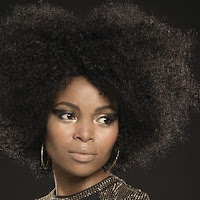William Charlton-Perkins writes a regular
feature for the media titled Classical Notes. This one is titled 10 South African Sopranos.
The Playhouse Company’s iconic concert titled 10 South African Sopranos, takes place in Durban on Sunday March 26 at 14h00. This features a stellar line-up of the country’s top sopranos.
Headlined by internationally-acclaimed divas Sibongile Mngoma and Pumeza Matshikiza. Ms Mngoma has performed throughout the world, shining her light in many of the greatest performance venues. The diva’s versatility allows her to embrace the divergent genres of opera, gospel, and jazz with extraordinary facility.
(Right: Pumeza Matshikza. Photo: Simon Fowler, Decca)
Pumeza Matshikiza is one of today’s leading sopranos. An exclusive Decca Recording Artist, she performed in the opening of the Commonwealth Games in Scotland, took part in the Royal Variety Show alongside Dame Shirley Bassey, and recently scored a major triumph at Covent Garden’s Royal Opera in London.
The Playhouse’s glittering event also stars luminaries such as Nozuko Teto, Khumbuzile Dlamini, Siphamandla Moyake, Pumza Mxinwa, Zolina Ngejane, Sasa N Yende, Brenda Thulo and Khayakazi Madlala. Accompanied by members of the KZN Philharmonic Orchestra, the singers will perform a selection of the world’s best-loved arias, including, among others, the immortal Song to the Moon from Dvorak’s Rusalka; as well as show-stopping highlights from Puccini’s Tosca and La Bohème; and Verdi’s La Forza del Destino, along with a number of iconic Zulu vocal gems.
(Left: Sibongile Mngoma – supplied)
By way of garnering awareness for the upcoming concert, I engaged with Sibongile Mngoma, who has curated this programme and liaised with the line-up on behalf of the Playhouse:
SM: Yes, it has been a conscious decision. I spent many hours talking to members of my family, particularly my late aunt Sibongile Khumalo and my brother Mholi, discussing the message that I want to communicate. My grandfather was a proud African historian and archivist of our music and traditions. So, yes - it was deeply embedded in my subconscious and conscious from an early age that I'm a proud African.
WCP: During the years of apartheid, the arts were used as a powerful means of protest against the crimes against humanity. The arts retain their power in this respect today. Not only in SA, but the world over. How does this inform your work in the field of activism, to promote justice for artists in our country, and also beyond the boundaries of the arts?
SM: This remains a key focus of my Activism. We can tackle issues by using the principles that work in making excellent art products. Discipline, focus, meticulous attention to detail and integrity. With those principles in place, it's possible to hold those in power and us accountable.
WCP: Women in your family have a history of carrying forward the tradition of making music a profession that reaches beyond the boundaries of mere entertainment, to carry a message of hope and empowerment to the audiences it reaches.
SM: Our family encourages both men and women to learn and grow their music knowledge and understanding. The women in our family have a special gift for healing others through music. We have been blessed to be afforded the opportunities to touch lives in this country and beyond. We don't take that for granted. It's not by our own might but by God's grace.
WCP: In partnering with The Playhouse Company, by curating and appearing in “10 South African Sopranos”, you are putting your name on the line. The Playhouse has a proud history of doing sterling work (notably in the fields of social issues that affect society, and particularly with regard to women and children). Many of these, it seems to me, tie in with the principles of family’s ethics?
SM: My first response to curating the 10 South African Sopranos at the Playhouse Company was to not sing in it. This came from previous experience of curating, producing, and directing other shows and having to sing. It's gruelling work that takes its toll on a person. I'm excited and nervous but I'm also encouraged by the sopranos that are going to sing. They are so amazing, and I don't need to carry them. They will carry me, and we will have an amazing experience. I'm also excited because this instalment of the 10 South African Sopranos speaks very strongly to the resilience of the spirit of a woman.
WCP: You have reached a stage in your career where you are justly regarded as a doyenne of South Africa’s great tradition of world class singing. Your example serves as a role model for many who follow in your footsteps. Has mentoring the new-generation artists played a role in the selection of singers who will appear with you onstage at the Playhouse?
SM: I wish I did mentor the younger generation as much as I would like. I do, however, follow closely the growth and development of our singers and when given an opportunity, I do put them on stage so that the world can experience the magic that is our beautiful singers. I am happy to share that this instalment of the 10 South African Sopranos also incorporates Maskandi and is LGBTQI + representative. This makes me very proud. We can't speak of transformation without showing it in our work. Inclusivity cannot be window dressing. It has to be real and actionable.
Tickets for The Playhouse Company’s 10
South African Sopranos @ R150 are available now through Webtickets. –
William Charlton Perkins














